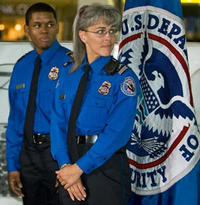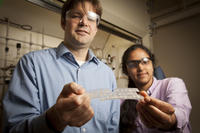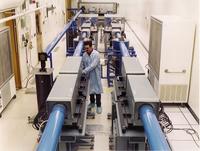-
Detecting explosives, not toothpaste
Researchers want airports, border checkpoints, and others to detect homemade explosives made with hydrogen peroxide without nabbing people whose toothpaste happens to contain peroxide. This is part of the challenge faced in developing a portable sensor to detect a common homemade explosive called a FOx (fuel/oxidizer) mixture, made by mixing hydrogen peroxide with fuels.
-
-
Environmental group sues State Department for Keystone XL-related files
The Sierra Club has announced it is suing the State Department for files related to an environmental review draft of the Keystone XL pipeline. The group tried to gain access to the files through the Freedom of Information Act, but the request was denied, so the group filed the suit on Monday in the U.S. District Court in the Northern District of California.
-
-
TSA’s behavior detection program not cost effective: DHS IG

DHS Inspector General (IG) has released a 41-page report last week stating that the Transportation Security Administration (TSA) cannot ensure that its behavior detection program, known as the Screening of Passengers by Observation Techniques (SPOT) is objective or cost-effective.
-
-
Making jet fuel from switchgrass

The Energy Department’s National Renewable Energy Laboratory (NREL) is partnering with Cobalt Technologies, U.S. Navy, and Show Me Energy Cooperative to demonstrate that jet fuel can be made economically and in large quantities from a renewable biomass feedstock such as switch grass. The project could spur jobs in rural America, lead to less reliance of foreign oil.
-
-
Fighting effectively without committing war crimes
Combat troops must minimize the humanness of their enemies in order to kill them. They cannot be effective fighters if they are distracted by feelings of empathy for opponents. Indifference to the enemy, rather than loathing, however, may help prevent war crimes and provide troops with a better path back to healthy civilian lives, researchers say.
-
-
Studying rare Earth elements in Alaska may help make them less rare
A unique deposit of heavy rare Earth elements (REE) at Alaska’s Bokan Mountain could help scientists understand how rare Earth element deposits form, according to new research. Rare Earth elements are important, but scarce, elements used in components in many cutting edge electronic and defense technologies.
-
-
Better weather predictions for the U.S. Navy
In a development that should significantly affect fleet operations, the U.S. Navy has adopted a new global weather forecasting model. The Naval Global Environmental Model (NAVGEM)could inform Navy operations for years to come. It is particularly important as U.S. fleet presence increases throughout the Asia-Pacific region, known for intense weather events like typhoons.
-
-
Highly sensitive polymer detects IEDs

A chemical which is often the key ingredient in improvised explosive devices (IEDs) can be quickly and safely detected in trace amounts by a new polymer created by a team of Cornell University chemists. The polymer, which potentially could be used in low-cost, handheld explosive detectors and could supplement or replace bomb-sniffing dogs.
-
-
Protecting and climate proofing Europe’s coast
The coastline of EU member states extends over 17,000 kilometers. It is home to seventy million inhabitants. The estimated value of the assets within 500 meters from the coast rises to a staggering 1,000 billion Euros. An EU-funded science and engineering initiative is gathering all relevant scientific knowledge to develop a systematic approach to deliver a safe, natural, and climate-proof European coast.
-
-
Laser-driven neutrons to detect nuclear smuggling

Researchers have successfully demonstrated for the first time that laser-generated neutrons can be enlisted as a useful tool in the war on terror, as Los Alamos shows first nuclear material detection by single short-pulse-laser-driven neutron source.
-
-
Students control a helicopter in flight using only brain waves
A remote controlled helicopter has been flown through a series of hoops around a college gymnasium in Minnesota. It sounds like your everyday student project; but there is one caveat: the helicopter was controlled using just the power of thought. The helicopter was controlled by a noninvasive technique called electroencephalography (EEG), which recorded the electrical activity of the students’ brains through a cap fitted with sixty-four electrodes.
-
-
U.S. unlikely to meet its biofuel goals

The Energy Independence and Security Act of 2007 (EISA) mandates that by 2022 the United States derive fifteen billion gallons per year of ethanol from corn to blend with conventional motor fuels. A new study says that if the climate continues to evolve as predicted by the Intergovernmental Panel on Climate Change, the United States stands little to no chance of satisfying its biofuel goals.
-
-
Wildfires in west, southwest forcing hundreds from their homes
The arrival of summer has typically been accompanied by an increase in the number and intensity of wild fires in the U.S. southwest, and this year is no exception.
-
-
Science Academies highlight role of science in meeting global challenges
Science academies from around the globe issued joint statements last week to call world leaders’ attention to the role science, technology, and innovation can play in the pursuit of sustainable development, and to raise their awareness of the emerging threat of drug resistance in infectious agents including tuberculosis. The “G-Science” statements are intended to inform government leaders attending next month’s G8 Summit and other international gatherings later this year.
-
-
California Democratic lawmakers want a go-slow approach to fracking
California may be on the verge of an oil rush. It is estimated that hydraulic fracturing, or fracking, at the Monterey Shale formation may tap reserves of fifteen billion barrels of oil. Democratic lawmakers do not see it that way, and have proposed numerous anti-fracking bills aiming to control the use of the controversial technology. Ten bills have been tabled so far, and more are on the way.
-
More headlines
The long view
A Shining Star in a Contentious Legacy: Could Marty Makary Be the Saving Grace of a Divisive Presidency?
While much of the Trump administration has sparked controversy, the FDA’s consumer-first reforms may be remembered as its brightest legacy. From AI-driven drug reviews to bans on artificial dyes, the FDA’s agenda resonates with the public in ways few Trump-era policies have.
Risk Assessment with Machine Learning
Researchers utilize geological survey data and machine learning algorithms for accurately predicting liquefaction risk in earthquake-prone areas.
Foundation for U.S. Breakthroughs Feels Shakier to Researchers
With each dollar of its grants, the National Institutes of Health —the world’s largest funder of biomedical research —generates, on average, $2.56 worth of economic activity across all 50 states. NIH grants also support more than 400,000 U.S. jobs, and have been a central force in establishing the country’s dominance in medical research. Waves of funding cuts and grant terminations under the second Trump administration are a threat to the U.S. status as driver of scientific progress, and to the nation’s economy.
The True Cost of Abandoning Science
“We now face a choice: to remain at the vanguard of scientific inquiry through sound investment, or to cede our leadership and watch others answer the big questions that have confounded humanity for millennia —and reap the rewards.”
Bookshelf: Smartphones Shape War in Hyperconnected World
The smartphone is helping to shape the conduct and representation of contemporary war. A new book argues that as an operative device, the smartphone is now “being used as a central weapon of war.”
New Approach Detects Adversarial Attacks in Multimodal AI Systems
New vulnerabilities have emerged with the rapid advancement and adoption of multimodal foundational AI models, significantly expanding the potential for cybersecurity attacks. Topological signatures key to revealing attacks, identifying origins of threats.
